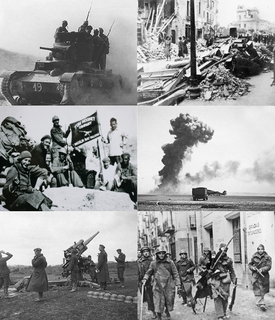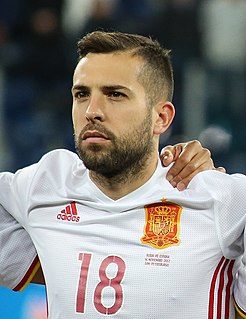
Francisco Franco Bahamonde was a Spanish general who led the Nationalist forces in overthrowing the Second Spanish Republic during the Spanish Civil War and thereafter ruled over Spain from 1939 to 1975 as a dictator, assuming the title Caudillo. This period in Spanish history, from the Nationalist victory to Franco's death, is commonly known as Francoist Spain or the Francoist dictatorship.

Spain, officially the Kingdom of Spain, is a country in Southwestern Europe with some pockets of territory in the Mediterranean Sea, offshore in the Atlantic Ocean and across the Strait of Gibraltar. Its continental European territory is situated on the Iberian Peninsula, and its insular territory includes the Balearic Islands in the Mediterranean Sea, several small islands in the Alboran Sea and the Canary Islands in the Atlantic Ocean. The Spanish territory also includes the African semi-exclaves of Ceuta, Melilla and Peñon de Vélez across the Strait of Gibraltar. The country's mainland is bordered to the south by the British overseas territory of Gibraltar, to the south and east by the Mediterranean Sea; to the north by France, Andorra and the Bay of Biscay; and to the west by Portugal and the Atlantic Ocean.

The Virgin Islands are an archipelago in the Caribbean Sea. They are geologically and biogeographically the easternmost part of the Greater Antilles, the northern islands belonging to the Puerto Rico Trench and St. Croix being a displaced part of the same geologic structure. Politically, the British Virgin Islands have been governed as the western island group of the Leeward Islands, which are the northern part of the Lesser Antilles, and form the border between the Caribbean Sea and the Atlantic Ocean. The archipelago is separated from the true Lesser Antilles by the Anegada Passage and from the main island of Puerto Rico by the Virgin Passage.

The Peninsular War (1807–1814) was the military conflict fought by Spain, the United Kingdom and Portugal against the invading and occupying forces of France for control of the Iberian Peninsula during the Napoleonic Wars. In Spain, it is considered to overlap with the Spanish War of Independence. The war began when the French and Spanish armies invaded and occupied Portugal in 1807 by transiting through Spain, and it escalated in 1808 after Napoleonic France had occupied Spain, which had been its ally. Napoleon Bonaparte forced the abdications of Ferdinand VII and his father Charles IV and then installed his brother Joseph Bonaparte on the Spanish throne and promulgated the Bayonne Constitution. Most Spaniards rejected French rule and fought a bloody war to oust them. The war on the peninsula lasted until the Sixth Coalition defeated Napoleon in 1814, and it is regarded as one of the first wars of national liberation and is significant for the emergence of large-scale guerrilla warfare.

At the Battle of Vitoria a British, Portuguese and Spanish army under the Marquess of Wellington broke the French army under King Joseph Bonaparte and Marshal Jean-Baptiste Jourdan near Vitoria in Spain, eventually leading to victory in the Peninsular War.

Charles II of Spain, known as the Bewitched, was the last Habsburg ruler of the Spanish Empire. Best remembered for his physical disabilities and the War of the Spanish Succession that followed his death, Charles' reign has traditionally been viewed as one of managed decline. However, many of the issues Spain faced in this period were inherited from his predecessors and some recent historians have suggested a more balanced perspective.

Gipsy Kings are a group of flamenco, salsa, and pop musicians from Arles and Montpellier in the south of France, who perform mostly in Spanish, but also mixing southern French dialects. Although the group members were born in France, their parents were mostly gitanos, Spanish Romani who fled Spain during the 1930s Spanish Civil War. They are known for bringing rumba flamenca, a pop-oriented music distantly derived from traditional flamenco music, to worldwide audiences. The group originally called itself Los Reyes.

The Spanish Socialist Workers' Party is a social-democratic political party in Spain. The PSOE has been in government longer than any other political party in modern democratic Spain, namely from 1982 to 1996 under Felipe González; from 2004 to 2011 under José Luis Rodríguez Zapatero; and currently since 2018 under Pedro Sánchez.

The Communist Party of Spain is a Marxist-Leninist party that, since 1986, has been part of the United Left coalition, which is part of Unidas Podemos.
The Republican Left of Catalonia is a pro-Catalan independence, social-democratic political party in the Spanish autonomous community of Catalonia, with a presence also in Valencia, the Balearic Islands and the French department of Pyrénées-Orientales. It is also the main sponsor of the independence movement from France and Spain in the territories known as Catalan Countries, focusing in recent years on the creation of a Catalan Republic in Catalonia proper. Its current president is Oriol Junqueras and its secretary-general is Marta Rovira. The party is a member of the European Free Alliance.

The Basque Country is the name given to the home of the Basque people. The Basque country is located in the western Pyrenees, straddling the border between France and Spain on the coast of the Bay of Biscay. Euskal Herria is the oldest documented Basque name for the area they inhabit, dating from the 16th century.

The Spanish Republic, commonly known as the Second Spanish Republic, was the form of government in Spain from 1931 to 1939. The Republic was proclaimed on 14 April 1931, after the deposition of King Alfonso XIII and was dissolved on 1 April 1939 after surrendering in the Spanish Civil War to the Nationalists led by General Francisco Franco.

The Spanish Civil War was a civil war in Spain fought from 1936 to 1939. Republicans loyal to the left-leaning Popular Front government of the unstable Second Spanish Republic, in alliance with anarchists of the communist and syndicalist variety, fought against an insurrection by the Nationalists, an alliance of Falangists, monarchists, conservatives and traditionalists, led by a Military junta among whom General and later Captain general of the Army, Francisco Franco quickly achieved a preponderant role. Due to the international political climate at the time, the war had many facets and was variously viewed as class struggle, a religious struggle, a struggle between dictatorship and republican democracy, between revolution and counterrevolution, and between fascism and communism. According to Claude Bowers, U.S. ambassador to Spain during the war, it was the "dress rehearsal" for World War II. The Nationalists won the war, which ended in early 1939, and ruled Spain until Franco's death in November 1975.

Ferdinand Magellan was a Portuguese explorer and a subject of the Hispanic Monarchy from 1518. He is best known for having planned and led the 1519 Spanish expedition to the East Indies across the Pacific Ocean to open a maritime trade route, during which he discovered the interoceanic passage bearing thereafter his name and achieved the first European navigation from the Atlantic to Asia. While on this voyage, Magellan was killed in the Battle of Mactan in 1521 in the present-day Philippines, but some of the expedition's surviving members, in one of the two remaining ships, subsequently completed the first circumnavigation of the Earth when they returned to Spain in 1522.

Jordi Alba Ramos is a Spanish professional footballer who plays as a left-back for La Liga club Barcelona and the Spain national team.

United Left is a federative political movement in Spain that was first organized as a coalition in 1986, bringing together several left-wing political organizations, most notably the Communist Party of Spain.
Podemos is a left-wing populist political party in Spain. Part of the anti-austerity movement in Spain, it was founded in January 2014 by political scientist Pablo Iglesias Turrión and other academics in the aftermath of the 15-M Movement protests against inequality and corruption. It is on the left wing of the political spectrum.
Unidas Podemos, formerly called Unidos Podemos and also known in English as United We Can, is a democratic socialist electoral alliance formed by Podemos, United Left, and other left-wing parties in May to contest the 2016 Spanish general election. The alliance's official pre-agreement was announced on 9 May 2016 after weeks of negotiations. It re-styled to the feminine form of its name ahead of the April 2019 Spanish general election.














